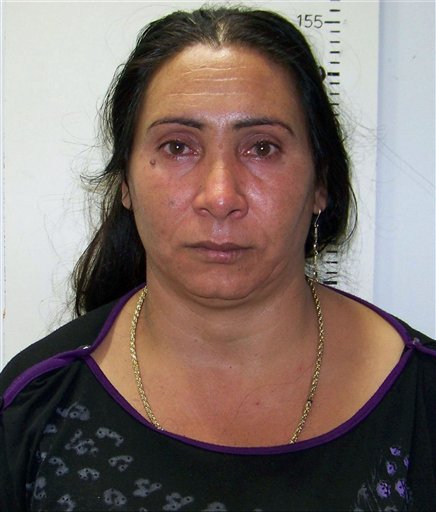
GREEK BIRTH CERTIFICATE PROBE IN ‘MARIA’ CASE
In this police handout photo taken on Thursday , Oct. 17, 2013, Greek Roma, Eleftheria Dimopoulou, 40, or Selini Sali —a woman who has two separate sets of identity papers. is seen in the Larisa regional police headquarters, Greece. Dimopoulou and her companion have been charged with abducting a little girl found living with them in a Gypsy settlement. Police in Greece on Monday, Oct. 21, 2013, have released the photographs of a couple alleged adductors of a girl known “Maria” after they were formally taken onto pre-trial custody and an international search for the girl’s parents intensified. (AP Photo/Greek Police)
ATHENS, Greece (AP) — A top Greek prosecutor has ordered an emergency nationwide investigation into birth certificates issued in the past six years after an unknown girl was discovered living with her alleged abductors at a Gypsy camp.
Supreme Court prosecutor Efterpi Koutzamani ordered the inquiry Tuesday for birth certificates issued after Jan. 1, 2008, amid media reports of benefit fraud by families who declared the same birth in multiple cities or who had produced false birth certificates for children that may or may not exist.
Critics say Greece’s birth registration system is wide open to exploitation. Until just five months ago, there was no central national registry. Even now, births declared in different municipalities before May are not cross-checked on a national basis.
The birth registry investigation was sparked after a Gypsy, or Roma, couple was jailed on charges of abduction and document fraud in the case of the girl known only as “Maria.” The blonde girl, believed to be 5 or 6, was found during a police raid on a Roma camp. She was taken into protective care last week after DNA tests established the Roma couple was not her biological parents.
Police said “Maria’s” birth was falsely declared in Athens in 2009 but did not elaborate. The charity in charge of the girl’s temporary care says a dental examination indicated she is five or six years old, not four as originally thought. It is not even certain the child was born in Greece.
The two suspects, aged 39 and 40, deny the abduction allegations, claiming they received “Maria” from a destitute woman to bring up as their own. They are now in pre-trial detention.
The girl’s DNA has been entered into an Interpol database to check for matches.
Authorities allege that the female suspect claimed to have given birth to six children in less than 10 months, while 10 of the 14 children the couple had registered as their own are unaccounted for. Police say the two suspects received about 2,500 euros ($3,420) a month in subsidies from three different cities — a substantial amount in the midst of Greece’s devastated economy.
On Monday, the mayor of Athens ordered the suspension of three officials in charge of record-keeping. It was not clear exactly why.
Earlier this month, the city of Athens had complained that “extremely problematic and antiquated” Greek laws allowed people to register babies as their own on the basis of one person’s declaration backed by two witnesses. Prior to the new registry, parents could have delayed registering their children until they turned 18.
New parents now have three months to declare their newborns. Investigators in Athens, however, had found a large number of babies had been declared near the end of that deadline, and they suspected some were multiple declarations to claim benefits from different areas.
The mystery girl’s case has triggered international interest in missing children. Irish police on Monday seized a young blonde girl from a Romanian Gypsy family in Dublin in a move spurred by the case in Greece.
The Irish government was seeking court approval Tuesday to take the girl into foster care while police investigate her origins. The couple in Dublin said the 7-year-old child was theirs, but a Dublin maternity hospital they identified had no record of the birth. Nobody has been arrested.
“Maria” was spotted during a police raid near the central Greek town of Farsala on Oct. 16. Greek police have carried out dozens of similar raids on Roma camps in the past few weeks in a crackdown on drug smuggling and burglary gangs.
Human rights groups are now worried that Europe’s Roma community as a whole is being unfairly targeted by authorities and the media. Europe’s top human rights official told The Associated Press he was worried about a possible backlash against Greece’s Roma minority.
“Of course it is a danger,” said Thorbjoern Jagland, Secretary General of Council of Europe, as he arrived in Athens for a two-day visit. “If a Roma family, a Roma people are involved in this, this should not lead to condemnation of the whole Roma society.”
___
AP writers Costas Kantouris in Thessaloniki and Nicholas Paphitis in Athens contributed.



